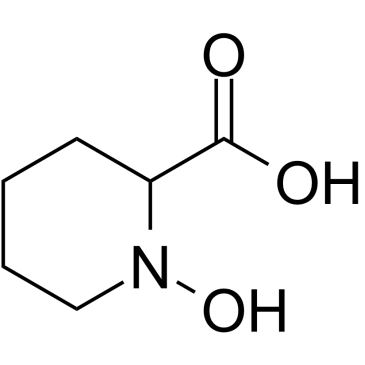N-Hydroxypipecolic acid |
| Catalog No.GC39247 |
N-Hydroxypipecolic acid (N-hydroxypipecolic acid), a plant metabolite, also plays a key role in SAR (systemic acquired resistance) and to a lesser extent in basal resistance.
Products are for research use only. Not for human use. We do not sell to patients.

Cas No.: 115819-92-6
Sample solution is provided at 25 µL, 10mM.
N-Hydroxypipecolic acid (N-hydroxypipecolic acid), a plant metabolite, also plays a key role in SAR (systemic acquired resistance) and to a lesser extent in basal resistance.[1] N-hydroxypipecolic acid requires basal salicylic acid and components of the salicylic acid signaling pathway to induce systemic acquired resistance genes.[2] N-hydroxypipecolic acid can confer immunity via the salicylic acid receptor NPR1 to reprogram plants at the level of transcription and prime plants for an enhanced defense capacity.[4]
In vitro experiment it shown that treatment of Arabidopsis Col-0 plants with a 1 mM N-hydroxypipecolic acid solution, either applied via the soil or sprayed on the leaf rosette, triggered a strong SAR response in the leaves.[3] In addition, when treatment with N-hydroxypipecolic acid in the individual leaves of Col-0 plants, acquired resistance developed not only in the treated leaves but also in distant, systemic leaves.[5] There is a strong N-hydroxypipecolic acid (1 mM)-mediated priming of the pathogen-triggered accumulation of camalexin. And exogenous N-hydroxypipecolic acid also strongly primed the N-hydroxypipecolic acid-deficient fmo1 mutant for the Psm-triggered accumulation of camalexin. Pretreatment with 1mM N-hydroxypipecolic acid also significantly primed the leaves for an enhanced accumulation of Pip and SA in response to the mock-infiltration, suggesting that N-hydroxypipecolic acid also primes responses to mechanical stress in Arabidopsis.[6]
References:
[1].Hartmann M, Zeier J. N-hydroxypipecolic acid and salicylic acid: a metabolic duo for systemic acquired resistance. Curr Opin Plant Biol. 2019 Aug;50:44-57.
[2].Nair A, et al. N-hydroxypipecolic acid-induced transcription requires the salicylic acid signaling pathway at basal SA levels. Plant Physiol. 2021 Dec 4;187(4):2803-2819.
[3].Schnake A, et al. Inducible biosynthesis and immune function of the systemic acquired resistance inducer N-hydroxypipecolic acid in monocotyledonous and dicotyledonous plants. J Exp Bot. 2020 Oct 22;71(20):6444-6459.
[4].Zeier J. Metabolic regulation of systemic acquired resistance. Curr Opin Plant Biol. 2021 Aug;62:102050.
[5].Chen YC, et al. N-hydroxy-pipecolic acid is a mobile metabolite that induces systemic disease resistance in Arabidopsis. Proc Natl Acad Sci U S A. 2018 May 22;115(21):E4920-E4929.
[6].Yildiz I, et al. The mobile SAR signal N-hydroxypipecolic acid induces NPR1-dependent transcriptional reprogramming and immune priming. Plant Physiol. 2021 Jul 6;186(3):1679-1705.
Average Rating: 5 (Based on Reviews and 37 reference(s) in Google Scholar.)
GLPBIO products are for RESEARCH USE ONLY. Please make sure your review or question is research based.
Required fields are marked with *





